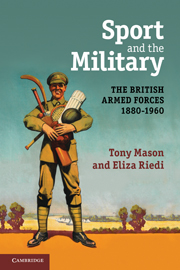Book contents
- Frontmatter
- Contents
- List of illustrations
- Acknowledgements
- Introduction
- 1 The growth of service sport, 1880–1914
- 2 Officer sports and their critics, 1880–1914
- 3 Sport in the Great War
- 4 The amateur era, 1919–39
- 5 Soldiers, sailors and civilians
- 6 A different kind of war
- 7 The national service years: the summit of military sport?
- Conclusion
- Select bibliography
- Index
2 - Officer sports and their critics, 1880–1914
Published online by Cambridge University Press: 05 December 2012
- Frontmatter
- Contents
- List of illustrations
- Acknowledgements
- Introduction
- 1 The growth of service sport, 1880–1914
- 2 Officer sports and their critics, 1880–1914
- 3 Sport in the Great War
- 4 The amateur era, 1919–39
- 5 Soldiers, sailors and civilians
- 6 A different kind of war
- 7 The national service years: the summit of military sport?
- Conclusion
- Select bibliography
- Index
Summary
The Duke of Wellington said that Waterloo was won on the playing- fields of Eton. Of … the South African War it has been said that the guns at Sannah’s Post were captured on the polo-ground at Hurlingham; that Magersfontein was lost at Lords; that Spion Kop was evacuated at Sandown Park; and that the war dragged on for 32 months in the Quorn and Pytchley coverts – because the British officer was accustomed to look upon war as a branch of sport.
‘W. T.’ to the Editor, The Times, 2 June 1916Before 1914 criticism of sport in the army focused overwhelmingly on officer sports. In the aftermath of the Boer War officer recruitment and education were among the key topics addressed by army reformers. Officer sport – and especially polo – was attacked as a major contributing factor in the ‘extravagance’ that restricted commissioned ranks in the cavalry to those with substantial private incomes, and defended on the grounds that it promoted officer-like qualities and acted as a form of military training. Tim Travers has suggested that the Edwardian period saw the ‘convergence and frequent conflict’ of two ideals of war – the new ‘technical, functionally competent, professional ideal’ and the ‘traditional, gentlemanly, amateur ideal’. For the cavalry, Brian Bond, Edward Spiers, Gerald DeGroot and the Marquis of Anglesey have charted how the movement towards reform of cavalry doctrine in the first years of the twentieth century was rapidly thwarted by the ‘forces of reaction’. A key aspect of this reaction was what Spiers has called the ‘gentlemanly officer tradition’. The officer corps was, almost entirely, made up of those who could claim to be ‘gentlemen’. As a group they cherished a heroic and chivalric concept of war, valued ‘character’ and morale over intellect and professional training, and attached a high importance to sporting activities. The Edwardian debates over the place of sport in the officer lifestyle, hitherto largely unexamined, therefore provide a revealing sidelight on the ethos of the pre-1914 army. This chapter explores the role of equestrian sport in the ‘gentlemanly officer tradition’ and describes the prolonged and ultimately futile campaigns before 1914 to restrict it in the cause of a more diverse and meritocratic officer corps.
- Type
- Chapter
- Information
- Sport and the MilitaryThe British Armed Forces 1880–1960, pp. 50 - 79Publisher: Cambridge University PressPrint publication year: 2010



